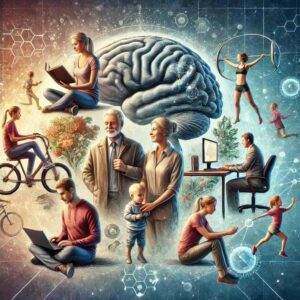Ever wonder why it’s so much easier to give great advice to others, yet when it comes to your own decisions, you keep making the same mistakes over and over? 🤔
Well, it’s a real thing—and it even has a name! This common experience is called Solomon’s Paradox. It’s a fascinating bias where we can think clearly and logically about other people’s problems but struggle to see our own challenges with the same clarity.
If the idea of making wiser decisions and taking control of your life sounds appealing, this article is for you.
Let’s explore the science behind clear thinking and uncover practical strategies to help you make better choices every day. 🌟

The paradox is named after King Solomon, renowned for his legendary wisdom in advising others but infamous for making questionable choices in his own life. 👑 It’s a powerful reminder of how our emotional attachments can cloud judgment when we’re personally involved.
The good news? Advancements in neuroscience and psychology have uncovered proven strategies to help us overcome this bias. With the right tools, we can make wiser, more balanced decisions—not just for others, but for ourselves too. 🌟
What Is Solomon’s Paradox? 💡

Solomon’s Paradox describes why we’re often better at giving advice to others than solving our own problems. When it comes to personal dilemmas, emotional entanglement clouds our thinking, leading to impulsive ⚡ or overly cautious 🛑 decisions.
🔍 Key Research:
Psychologist Igor Grossmann’s studies reveal that emotional interference distorts our judgment when we face personal challenges. In contrast, when we evaluate someone else’s problems, we naturally step back, gaining perspective and clarity.
Why Does This Happen?

Predictive Processing Theory (PP):Your brain is a prediction machine. It constantly anticipates outcomes based on your past experiences, helping you navigate the world efficiently.
However, when it comes to your own challenges, emotional interference often disrupts this process. Strong feelings like fear, anxiety, or attachment cloud your ability to see things objectively, leading to impulsive or overly cautious decisions.
This is why we often make poorer decisions for ourselves than we do for others. Our emotions get in the way, distorting the brain’s natural prediction process.
It’s much easier to stay logical and detached when the emotional stakes are lower—like when the problem belongs to someone else.
The good news? You can train yourself to bring that same level of objectivity to your own challenges. By practising proven strategies, you can step back, reduce emotional interference, and start making wiser, more balanced decisions in your own life.
Why Does Solomon’s Paradox Matter? 🏠💼

Understanding Solomon’s Paradox isn’t just a thought experiment—it has real-life implications that affect every area of our lives:
- In Relationships 💖: You might advise a friend to set healthy boundaries, but hesitate to do the same in your own relationships due to fear or guilt.
- In Your Career 🚀: Encouraging someone else to take a calculated risk is easy, but when it’s your turn, fear of failure can leave you paralysed.
- In Finances 📈: You may confidently tell a friend to budget wisely, yet your own money decisions feel overwhelming and confusing.
Why It Matters:
Recognising this bias is the first step to breaking free from it. Once you’re aware, you can begin to gain the clarity and perspective needed to make wiser decisions in your own life.
Now that we’ve explored what Solomon’s Paradox is, why it happens, and the impact it has on our lives, let’s dive into some simple, science-backed practices to help anyone overcome this evolutionary bias.
These strategies will empower you to think more clearly, make wiser decisions, and break free from the emotional entanglement that clouds your judgment. 🌟
How to Overcome Solomon’s Paradox: Self-Distancing Techniques 🧘♂️✨

The key to overcoming Solomon’s Paradox is learning how to step back and view your own challenges with objectivity. This practice, known as Self-Distancing, is like hitting pause on your emotional reactions, allowing you to think clearly and act wisely.
Why Self-Distancing Works
Your brain operates on two levels:
- The Emotional Brain: Reacts quickly to perceived threats or opportunities, often clouding judgment with immediate feelings. ⚡
- The Logical Brain: Processes long-term consequences and rational thinking but takes longer to engage. 🧠
Self-distancing creates the mental space needed to shift from the emotional brain to the logical brain. By stepping back from the heat of the moment, you reduce emotional interference and give your brain the time it needs to process information with greater clarity and objectivity.
Proven Self-Distancing Techniques
1. Think in the Third Person 🗣️

Instead of asking yourself, “What should I do?” reframe the question as, “What should [your name] do?”
-
Why it works:
Using third-person language creates a psychological distance between you and your problem, helping you step into the role of an observer. This shift reduces emotional bias and allows you to think like a wise advisor rather than a reactive participant. -
The science:
Research shows that this technique activates brain regions responsible for analytical thinking, enabling you to focus on the facts rather than being overwhelmed by feelings. By removing yourself from the emotional immediacy of the situation, you gain clarity and perspective.
2. Imagine It’s a Friend’s Problem 👥

Instead of treating the issue as your own, imagine it belongs to a close friend. Ask yourself, “What advice would I give them?”
-
Why it works:
Advising others naturally activates your problem-solving abilities. By pretending the problem isn’t yours, you bypass the emotional noise that often clouds personal decisions. -
The science:
Neuroscience shows that viewing a problem from someone else’s perspective activates the brain’s empathy and reasoning centres, helping you think with greater clarity and creativity. This mental shift lets you approach the challenge with a more logical, objective mindset.
3. Take a Fly-on-the-Wall View 🕊️

Visualise yourself as a neutral observer, watching the situation unfold as if it were a movie or a scene on stage.
-
Why it works:
This technique allows you to detach from immediate emotions, creating mental distance from the problem. By stepping into the role of an observer, you gain a broader perspective and can identify patterns or solutions that might be harder to see when you’re too emotionally involved. -
The science:
Visualisation helps your brain process challenges from a third-party perspective, reducing emotional reactivity and enabling more rational, solution-focused thinking. This detachment allows you to see the “big picture” and consider creative approaches you might otherwise overlook.
4. Focus on Long-Term Outcomes 📅

When faced with a tough decision, ask yourself: “How will this affect me a year from now?”
-
Why it works:
Shifting your focus to long-term consequences helps you step away from the immediate stressors and emotions clouding your judgment. This broader perspective allows you to prioritise what truly matters, align your actions with your values and goals, and reduce the likelihood of impulsive decisions driven by short-term feelings. -
The science:
Research shows that thinking about future outcomes engages the prefrontal cortex, the part of your brain responsible for planning and rational decision-making. This activation helps you weigh your options more effectively, leading to decisions that are both logical and aligned with your long-term well-being.
5. Journal with Distance 📓

When facing a challenge, write about it as if you’re giving advice to someone else. Frame your journaling in the third person to create distance and clarity.
-
Why it works:
Journaling forces you to slow down and organise your thoughts. Writing from a third-person perspective adds an extra layer of objectivity, helping you separate emotions from facts. This practice encourages you to step back and approach the problem as an advisor rather than a participant. -
The science:
Studies show that journaling activates brain regions responsible for emotional regulation and problem-solving. This makes it easier to process complex feelings, reduce emotional reactivity, and uncover practical solutions. Writing also helps you visualise the situation more clearly, giving you the clarity needed to move forward.
Why Gradual Progress Matters 🌱

Wisdom isn’t a switch you flip—it’s a skill you build over time. Taking small, manageable steps lets your brain adapt naturally, making it easier to sustain improvements.
Start with minor challenges:
- Journal about everyday dilemmas. 📓
- Reframe simple problems in the third person. 🗣️
Each small victory strengthens your ability to make objective, balanced decisions.
Real-Life Benefits of Overcoming Solomon’s Paradox

1️⃣ Better Decision-Making: Approach personal challenges with clarity and objectivity. 🎯
2️⃣ Improved Relationships: Resolve conflicts more effectively by seeing the bigger picture. 💬❤️
3️⃣ Reduced Stress: Distance yourself from emotional overwhelm and focus on solutions. 🌿
4️⃣ Personal Growth: Gain deeper insights into your values and priorities. 🚀
✅ Do’s and ❌ Don’ts for Self-Distancing

✅ Do:
- Start small and practise regularly. 📓
- Seek feedback from trusted friends to refine your perspective. 💬
- Celebrate progress—it reinforces the habit. 🌟
❌ Don’t:
- Avoid tough decisions. Growth happens outside your comfort zone. 🌱
- Expect perfection. Progress is gradual; mistakes are part of the process. ⏳
- Overanalyse—sometimes simplicity is the best approach. 💡
🌟 Final Thoughts: Unlock Your Inner Wisdom

The Solomon’s Paradox highlights a profound truth: clarity comes from detachment.
By practising self-distancing, you give yourself the power to think objectively, make wiser choices, and grow as a person.
The next time you feel stuck, pause and ask yourself: “What would I tell a friend in this situation?” This simple shift can open the door to new perspectives, allowing you to tackle life’s challenges with greater confidence and clarity. 🌱✨
Found this guide helpful? Help others discover the Getting to Give Project by sharing it 💫. Your support allows more people to access cutting-edge, science-backed resources at no cost 🌟. Thank you for reading!
📚 Further Reading on the Solomon Paradox
“Exploring Solomon’s Paradox: Self-Distancing Eliminates the Self-Other Asymmetry in Wise Reasoning About Close Relationships in Younger and Older Adults” by Igor Grossmann and Ethan Kross
This foundational study investigates how adopting a self-distanced perspective can mitigate the tendency to reason more wisely about others’ problems than one’s own. The research highlights the cognitive and emotional benefits of self-distancing in enhancing personal decision-making.
“Self-Distancing: Theory, Research, and Current Directions” by Ethan Kross and Özlem Ayduk
This comprehensive review delves into the mechanisms and outcomes of self-distancing, providing insights into how this strategy aids in emotional regulation and promotes wiser reasoning. The authors discuss various approaches to self-distancing and their implications for psychological well-being.
“The Psychological Mechanisms Underlying Solomon’s Paradox: The Role of Self-Transcendence and Mood”
This article explores the psychological processes that contribute to Solomon’s Paradox, focusing on how self-transcendence and mood influence individuals’ reasoning about personal versus others’ conflicts. The study offers a nuanced understanding of the factors that affect wise reasoning.




















